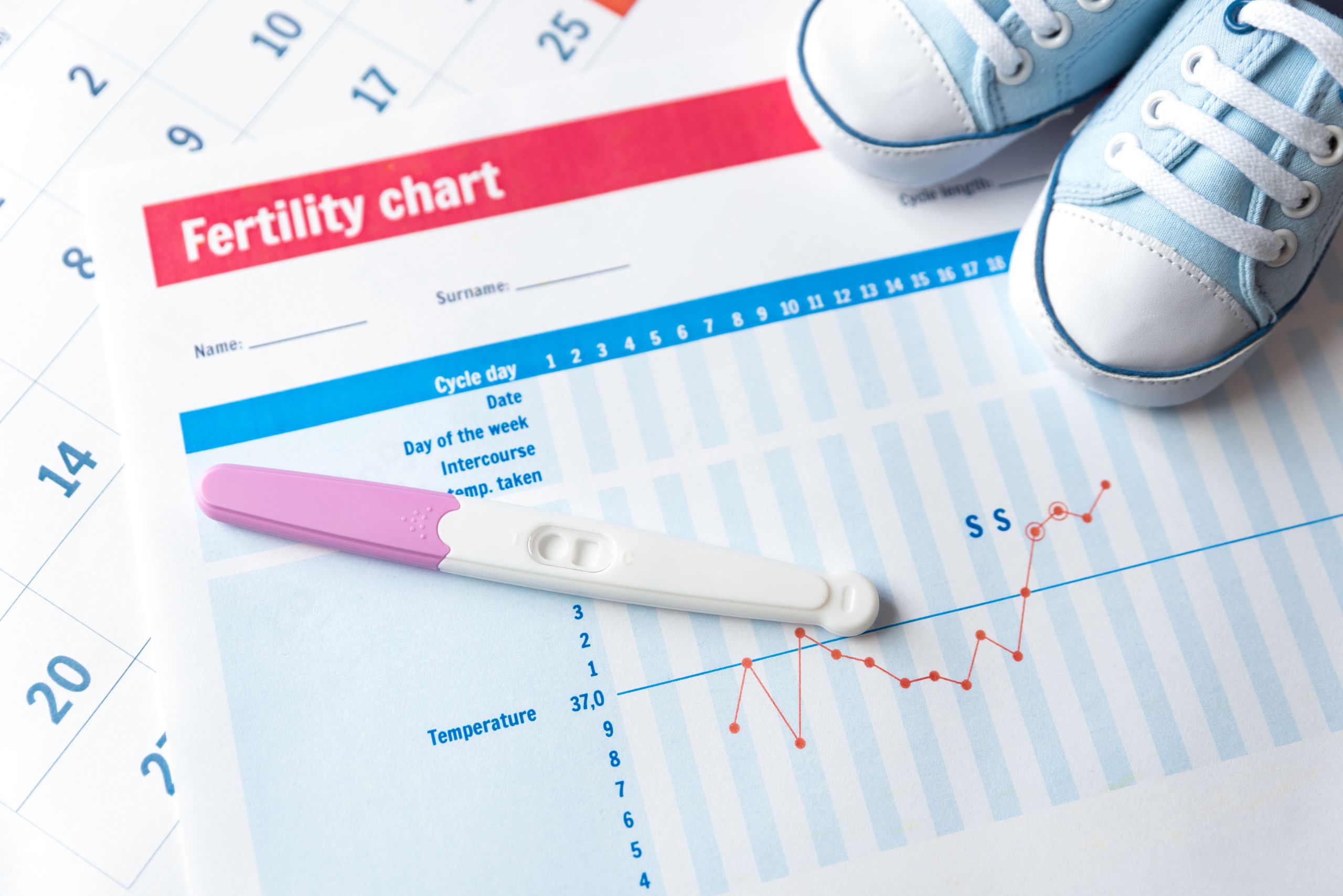
Trying for a baby can be tough on you and your partner. It can feel clinical and stressful as you work to conceive within the fertility window and do everything within your power to increase your chances of getting pregnant. But, if you’re struggling, you’re not alone.
It might seem that people easily get pregnant, but that’s not true. Many partners find it hard and have to work together to start a family. Although it may feel disheartening, there are many things you can do to increase your chances. Read on to find out what affects your fertility and how to improve it.
What is Female Fertility?
Female fertility is when a woman is trying to conceive (get pregnant) through deliberate unprotective sex. They may use an ovulation chart to increase the chances of having a baby with their partner. Aside from naturally conceiving (through intercourse), there are other methods to get pregnant, such as IVF and sperm donors, which the article will get into later.
How is Women’s Fertility Different to Men’s?
Women get pregnant from having unprotected sex. The man’s sperm travels up the fallopian tube and impregnates an egg. I’m sure you learnt all of this in school, but it’s worth remembering how it works to understand the mechanics behind conceiving.
It’s a common misconception that women can get pregnant anytime or that their cycles are exactly 28 days. They can be as long as 35 days, and the length of your cycle can also increase if you are under stress. Contrary to popular belief, women can only conceive within four to six days of their menstrual cycle. However, men are fertile 24/7, 365 days out of the year!
Only 14% of women with a 28 day cycle actually ovulated on day 14.
What Negatively Affects Women’s Fertility?
- Smoking – The 5,000 chemicals you consume through smoking a cigarette can, unsurprisingly, disrupt hormone levels and make it hard to conceive. It also increases the risk of cervical cancer and creates complications with the baby before and after birth.
- Excess alcohol – too much alcohol in your system may lead to an irregular menstrual cycle, significantly reducing fertility. Cut back on the units to ensure your body is healthy.
- A poor diet – It’s all about balancing your hormones when you’re trying to get pregnant, and a bad diet will disrupt them.
Spiking your blood pressure with a sudden burst of sugar and eating fast food that causes inflammation will impact your body’s ability to get pregnant. - Stress – High stress releases cortisol (a hormone) that disrupts other hormone levels for pregnancy. Stress by itself is highly unlikely to impact getting pregnant, but it can take longer. Starting a family can be stressful, so do your best to incorporate stress-reducing techniques. The best way to do this is to implement habits to include them in your daily routine.
- Age – Women’s fertility rates reach their highest between their late teens-twenties and drop around 35. However, many women have babies later in life due to pursuing careers or financial strain. It is more than possible to get pregnant after 35, but you will need to improve your chances.
86% of women conceive between the ages of 30-34. You can only get pregnant if you still have a menstrual cycle. Therefore, it is not possible once you have menopause. - STIs – Sexually transmitted diseases such as untreated chlamydia and syphilis can affect fertility rates. If you contract an STI, contact your doctor to take the proper medication or antibiotics. You can take an STI blood test to regularly care for your sexual health and read more about STIs for a healthy body.
- Weight – If you are under or overweight, it can impact fertility. If you are severely underweight, you are not fueling your body enough, and it starts to shut down. One of the first non-essential things it needs to survive is its fertility. Therefore, your periods may stop, making it impossible to get pregnant.
Being overweight also decreases your chances of starting a family (that goes for both men and women). If a woman is carrying too much weight, it increases a hormone called leptin. Leptin tells you when you are full and have enough energy stored in your fat cells. However, when your levels are too high, it will take longer for your body to signal to stop eating. This is known as ‘leptin resistance’ and affects other hormones.
Any disruption of hormones will negatively impact fertility rates because it will unbalance the menstrual cycle and other areas of the body. You need to harmonise leptin levels to up your chances of conceiving (more on that in the following section).
If you are struggling with an eating disorder, it could be the first thing you must tackle to increase your chances of conceiving. Although it may feel daunting, remember that you deserve to raise a family. Therefore you need to look after your body. Losing or gaining weight is not about ‘shedding’ or ‘putting on’ fat. It’s actually decreasing or increasing your fat cells, so nurture your body, talk to it kindly, and make it the best environment for your baby to grow.
How to Increase Your Fertility
Balance leptin levels – The hormone leptin will decrease your chances of conception because it disrupts the hypothalamic-pituitary-gonadal (HPG), which is responsible for the reproductive hormones that release eggs. Excess weight may increase leptin levels, so keep your body healthy to reduce the risk.
Move more – Remember, hormone balancing is the key to increasing fertility and moving helps you do that. It regulates your blood sugar levels and increases blood flow. The result gives your body an easier time transporting hormones vital for conception.
Feed your body with the right nutrients – Whole grains, nuts, seeds, fruit, veggies, oily fish, and lean meats are a must in your diet because they reduce inflammation. When your body has inflammation issues, it expands the blood vessels making it harder for blood to flow around the body. When blood flow is low, it cannot efficiently transport the nutrients and hormones around for fertility.
Use ovulation trackers – Ovulation trackers show you when you are most fertile. It typically calculates it uses your temperature, discharge, and cervix height. Your temperature rises slightly around ovulation, and your discharge becomes more slippery, making it easier for the sperm to travel up the fallopian tube. You can get some great fertility apps to track your menstrual cycle.
Check your fertility with a blood test – Taking a fertility blood test to manage your hormones and fertility levels is an excellent way to get a clear insight into your body. It will detect any imbalances and tell you what you need to do to help pregnancy.
FAQs
What age does a woman stop being fertile?
You do not stop being fertile until you have menopause, usually around 45-55 years old. However, fertility rates reach their highest from teens to late twenties and decrease from 35 years old onwards.
What are signs of good fertility in a woman?
If you are healthy, don’t smoke or drink alcohol, and don’t have an STI, it’s a good indicator of a woman’s fertility level. Regular periods that aren’t painful or excessively heavy are also crucial because they show that your hormones are balanced- vital for conception.
Is 37 too old to get pregnant?
No. Although it is more difficult to get pregnant, you will still have the ability to conceive until menopause. Many women start families later (the average age is around 33 years). Therefore, as long as you look after your body, you increase your chances of getting pregnant.
How can I check my Fertility Levels?
Here at Goodbody Clinic, we offer a Hormone and Fertility blood test that can be complete at home or in one of our nationwide clinics.
Our Fertility blood test requires just a small sample of blood which is then analysed at a leading UK laboratory.
Your results report will be sent back to you within 3-5 days with a helpful commentary from a registered GP to explain your results and provide guidance on next steps. With your results in hand, you’ll be armed with the knowledge you need to improve your fertility levels and increase your chances of pregnancy.
Find out more and book your test online via our Fertility blood test page.

